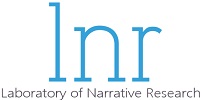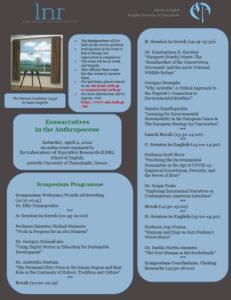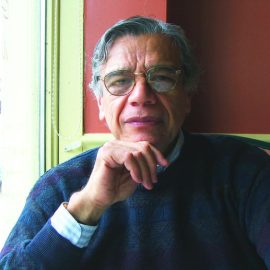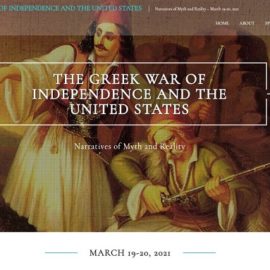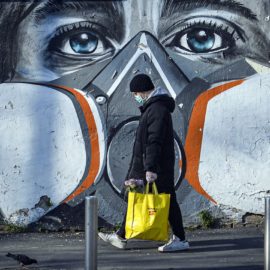The Laboratory of Narrative Research (LNR) is a teaching and research unit that is part of the School of English at Aristotle University of Thessaloniki. It has been designed to bring together scholars and researchers from across the humanities, the social sciences and other scientific fields who have a special interest in the workings and the politics of narrative production.
Lab Director: Dr Effie Yiannopoulou

Online Symposium
April 2, 2022
11:00-17:00
Participation in the event is free of charge, but registration is compulsory.
The event will be in Greek and English.
The official time zone for the event will be Greece time.
For questions, please contact us on: lnr@enl.auth.gr or semma@enl.auth.gr.
Over the past decades, the impact of human activities on the Earth system(s) has been encapsulated in the concept of the Anthropocene, a new geological epoch that clearly marks the repercussions of human-centeredness on biotic and abiotic factors. Recent articulations of the multilayered threats to the spheres (lithosphere, atmosphere, hydrosphere, biosphere) have informed global societies, sparked the literary imagination and largely propelled a novel interest in the agency/narrative force of nature. Moreover, scientific knowledge about humanity’s symbiotic relationship with the physical environment and the focus on ecological risk have given rise to new ways of imagining the interaction between humanity and nature, and vocalized the ethical dynamics in stewardship, intergenerationality, responsibility, and systems of care. Explorations of the above interrogate Western values that include inter alia domains of privilege, masculinist assumptions of resource exploitation, representations of the non-human, etymologies of the oikos and binary thinking.
The aim of this symposium is to investigate multi-inter-and-trans-disciplinary representations of “nature” or “the environment,” and to enhance what is commonly referred to as ecological awareness. How do the Humanities address the current environmental crises? Is the Anthropocene sufficiently incorporated in curricula, classroom practices and educational policies? What are the interconnections between environmental racism, ecological crisis and justice? How do the specificities of feminine experience(s) explain ecodestruction? How do we (re)define the human in relation to a multi-species context? How can knowledge production and acts of resistance be narrated at the intersections of art, philosophy and politics? What are the trends in mitigating ecodestruction, while at the same time safeguarding environmental health? How is scientific information about ecological risk problematized in narrative?
The symposium welcomes speakers (both scholars and policy makers) who will address some of these concerns, and also involve attendees in brief Q&A sessions.
Organizing Committee:
- Sophia Emmanouilidou (semma@enl.auth.gr)
- Theodora Patrona (tpatrona@enl.auth.gr)
- Maria Ristani (mristani@enl.auth.gr)
- Effie Yiannopoulou (yiannopo@enl.auth.gr)
Programme
Symposium Welcome/Words of Greeting (11:00-11:15)
Dr. Effie Yiannopoulou

Assistant Professor of English Literature and Cultural Theory, Department of English Literature and Culture, Aristotle University of Thessaloniki, Greece.
Director of the Laboratory of Narrative Research, School of English, Aristotle University of Thessaloniki, Greece.
Web page: click here
A: Session in Greek (11:15-12:30)
Chair: Dr. Tatiani Rapatzikou
With a 10-plus year research experience—within the framework of the Laboratory of New Technologies of the Department of Communication and Media Studies at the National and Kapodistrian University of Athens (NTLab UoA)—on various thematic areas (from bullying to studying Mathematics, and from celebrating National Holidays to femicide) using the process/tool of Digital Storytelling, and also being involved since the last century (!) with the study of Intergenerational Communication and Learning, and given the urgency of the climate change crisis, we will address this symposium with the presentation of a number of current activities that we are involved in. These are a) activities of the Association for UNESCO of Zakynthos, which has organized, among others, an art exhibition outdoors (in beaches, chapels, village squares) as well as in urban areas (ship lounges, coffee shops, taverns), b) the collaboration of the NTLab UoA with environmental and educational associations from Greece and abroad in the project “Climate Change and Environmental Protection: A Family Business,” where teenagers will serve as mentors for their parents, in order to establish a concrete shared understanding concerning environmental protection within the family, and c) the preparation of a doctoral thesis at the Department of Environment of the Ionian University, which will focus on the narration of the local history by centuries-old trees.
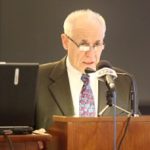 Professor Emeritus Michael Meimaris is the founder of the New Technologies Laboratory in Communication, Education and the Mass Media of the Faculty of Communication and Media Studies of the University of Athens. He has served as Head of the Faculty as well as Director of the University Research Institute of Applied Communication. He has studied Mathematics in the University of Athens and Statistics and Computer-Based Data Analysis in Paris (Université Paris VI, Pierre et Marie Curie). His scientific interests involve the application of New Technologies in Communication, Education and the Mass Media, Graphics and Computer Animation, the New Technological Communication Environment and its design, Digital Storytelling, Intergenerational Communication and Learning, Visual Communication, Digital Game-Based Learning, Open and Distance Education, as well as the training of educators in the New Technologies field. He is a member of the International Committee and President of the National Committee of the Möbius Awards, member of the Scientific Board of the Maison des Sciences de l’Homme Paris-Nord, as well as of C.I.T.I. of the University of Lisbon, and member of the jury of the French Laboratories of Excellence, action of the French National Research Agency (ANR). He has been a member of the Governing Board of the UNESCO Institute for Information Technologies in Education (IITE) since 2014. He has been awarded Chevalier de l’Ordre des Palmes Académiques of the French Republic.
Professor Emeritus Michael Meimaris is the founder of the New Technologies Laboratory in Communication, Education and the Mass Media of the Faculty of Communication and Media Studies of the University of Athens. He has served as Head of the Faculty as well as Director of the University Research Institute of Applied Communication. He has studied Mathematics in the University of Athens and Statistics and Computer-Based Data Analysis in Paris (Université Paris VI, Pierre et Marie Curie). His scientific interests involve the application of New Technologies in Communication, Education and the Mass Media, Graphics and Computer Animation, the New Technological Communication Environment and its design, Digital Storytelling, Intergenerational Communication and Learning, Visual Communication, Digital Game-Based Learning, Open and Distance Education, as well as the training of educators in the New Technologies field. He is a member of the International Committee and President of the National Committee of the Möbius Awards, member of the Scientific Board of the Maison des Sciences de l’Homme Paris-Nord, as well as of C.I.T.I. of the University of Lisbon, and member of the jury of the French Laboratories of Excellence, action of the French National Research Agency (ANR). He has been a member of the Governing Board of the UNESCO Institute for Information Technologies in Education (IITE) since 2014. He has been awarded Chevalier de l’Ordre des Palmes Académiques of the French Republic.Web page: click here
Digital stories have been used with several age groups, including early childhood, primary and secondary education, vocational training, adult education, and higher education. In the area of Environmental Education (EE) and Education for Sustainable Development (ESD), digital stories has been used for the lived experience of climate change, increasing not only university students’ knowledge, but also highlighting the different ways in which the climate change effects are perceived. Digital stories have also served for learning about urban sustainability, promote high school students’ awareness of environmental issues, and increase their environmental literacy by exploring the conservation topics on multiple levels. Digital storytelling (DS) has also served as a means to explore, observe and improve urban areas, while several walkability apps have been developed for the creation of urban diarists. Furthermore, UNESCO promotes DS as a strategic tool in educational and social contexts, while it is also suggested as an approach in the teaching and learning for a sustainable future. Examples of digital stories projects and educational activities, promoting urban social sustainability among undergraduate primary school students, will be presented and discussed. Associated teaching pedagogies, both in classroom (e.g., concept maps) and outdoors (e.g., site visits), and their role in promoting and facilitating digital stories will also be presented. Research aspects and analysis of digital stories and their respective learning effect will also be discussed.
 I was born in the Greek island of Samos and nurtured in Chania, Crete. I graduated from the Department of Primary Education, School of Education, University of Crete. I hold a master and a Ph.D. in the field of environmental education from the same University.
From 1998 to 2006 I served as a primary school teacher and from 2007 to 2010 as an Environmental Education Centre member. Since 2006 I teach at the Department of Primary Education, University of Western Macedonia (Florina), where I was elected as a Lecturer in 2009 and officially appointed in 2011 where I served until 2018. My current position is Assistant Professor in the Department of Primary Education, Aristotle University of Thessaloniki.
My main research interests are in the area of education for sustainability (ESD), environmental education (EE), science education (SE), on children’s conceptions regarding environmental issues and on the educational uses of footprints (Ecological, Energy, Water footprints). I also interested in about the development, implementation and evaluation of teaching and learning methods and materials aiming to conceptual development of pre-service and in-service teachers on the above issues, along with the professional development of their teaching methods.
I was born in the Greek island of Samos and nurtured in Chania, Crete. I graduated from the Department of Primary Education, School of Education, University of Crete. I hold a master and a Ph.D. in the field of environmental education from the same University.
From 1998 to 2006 I served as a primary school teacher and from 2007 to 2010 as an Environmental Education Centre member. Since 2006 I teach at the Department of Primary Education, University of Western Macedonia (Florina), where I was elected as a Lecturer in 2009 and officially appointed in 2011 where I served until 2018. My current position is Assistant Professor in the Department of Primary Education, Aristotle University of Thessaloniki.
My main research interests are in the area of education for sustainability (ESD), environmental education (EE), science education (SE), on children’s conceptions regarding environmental issues and on the educational uses of footprints (Ecological, Energy, Water footprints). I also interested in about the development, implementation and evaluation of teaching and learning methods and materials aiming to conceptual development of pre-service and in-service teachers on the above issues, along with the professional development of their teaching methods.Web page: click here
In the frame of the scientific program “Biomemories,” implemented on the islands of the Ionian Region, more than 1,000 perennial olives trees have been recorded. The aim of this paper is to promote the unique environmental and social significance of these trees as indicators of the continuing history, tradition and culture in the area. Every tree has its story, and throughout the centuries, or in some cases over the thousands of years of its life, perennial trees have contributed to the local economies and played their role as indicators for ecosystem services. The promotion of the importance of the perennial olive trees as natural monuments and as “ambassadors” of biodiversity can enable and inspire initiative for their protection. “Biomemories” has created a baseline data for ensuring that these trees will continue disseminate local history and culture to future generations. Research and activities of the program relate to a. the nutritional characteristics of the produced olive oil from the perennial olive trees, b. the importance of their ecosystem and biodiversity, c. the connection of (eco)touristic activities around the perennial olive groves, d. the accomplished task of estimating their age, e. the creation of promotional material, f. the environmental educational material that has been compiled, and will be presented in the symposium.
 Dr. Aristotelis Martinis, is Associate Professor of Environmental Management & Sustainable Development, Department of Environment at the Ionian University. He received his BA in Forestry and Management of Natural Resources from the Technological Educational Institute of Larissa and continued his studies at the Higher Pedagogical Teachers School. He completed his M.Sc. and Ph.D. degrees at the Department of Geography – “Aménagement du Territoire” of the University Paul Valery - Montp.III – France. For more than a decade, he worked as a forester in the Ministry of Agriculture for the mapping section and in parallel as a teacher in the secondary (school) education. Since 2005, he started teaching as a lecturer for the Department of Environmental Technology and Ecology at the Ionian Islands, and since 2021 he is Associate Professor at the Ionian University, Department of Environment. He has participated in many international and Greek scientific conferences, published his research in International Scientific Journals and Collected Volumes—Scientific Publications—and served as the scientific coordinator in many national and international research projects. His main research interests include Sustainable Development, Environmental Policy, Environmental Education, and Management of the Mediterranean Ecosystems.
Dr. Aristotelis Martinis, is Associate Professor of Environmental Management & Sustainable Development, Department of Environment at the Ionian University. He received his BA in Forestry and Management of Natural Resources from the Technological Educational Institute of Larissa and continued his studies at the Higher Pedagogical Teachers School. He completed his M.Sc. and Ph.D. degrees at the Department of Geography – “Aménagement du Territoire” of the University Paul Valery - Montp.III – France. For more than a decade, he worked as a forester in the Ministry of Agriculture for the mapping section and in parallel as a teacher in the secondary (school) education. Since 2005, he started teaching as a lecturer for the Department of Environmental Technology and Ecology at the Ionian Islands, and since 2021 he is Associate Professor at the Ionian University, Department of Environment. He has participated in many international and Greek scientific conferences, published his research in International Scientific Journals and Collected Volumes—Scientific Publications—and served as the scientific coordinator in many national and international research projects. His main research interests include Sustainable Development, Environmental Policy, Environmental Education, and Management of the Mediterranean Ecosystems.Web page: click here
Break (12:30-12:45)
B: Session in Greek (12:45-14:00)
Chair: Dr. Theodora Patrona
The presentation explores the interconnections between the beginnings of the American Conservation Movement, the birth of the United States Forest Service during the Roosevelt era, and the role of Margaret Thomas ‘Mardy’ Murie in the enactment of the Arctic National Wildlife Refuge in connection with the Indigenous peoples’ struggle for land rights. The debates between conservationists and preservationists in the late 19th century will be at the epicenter of the first part of the presentation in order to highlight the interconnections and controversies between the political reality of the era and current ideologies. The second and main part will focus on ‘Mardy’ Murie, the ‘Grandmother of the Conservation Movement,’ and her instrumental role in the creation of the Arctic National Wildlife Refuge. The analysis of her work and her deep impact on the conservation movement offer insights into the struggle of Indigenous peoples to protect their sacred lands. Murie’s and other naturalists’ and conservationists’ noble dream for a protected natural environment, and the enactment of several acts and laws that would safeguard preservation, proved to be inefficient. Despite their persistence to protect both the environment and the Indigenous peoples’ inherent sovereignty and reserved rights that exist off their reservation, the ‘Race for the Arctic,’ namely oil exploration, has been at the forefront of most U.S. governments since the 1970s, proving the power of economy over ethics or respect for the environment. Tracing the historical, political and economic connections in the case study above will offer an insight into the never-ending controversy and, ultimately, the failure to protect our fragile ecosystem.
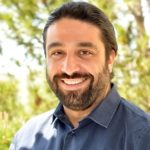 Dr. Konstantinos D. Karatzas is the director of GIRES, the Global Institute for Research Education & Scholarship based in Amsterdam, The Netherlands. He is specialized in twentieth-century international political history, with a particular interest in African American history and political and racial violence. His scholarly life is interconnected with Oklahoma and the struggle of the black community for independence and freedom in the United States. His pioneer research will be presented in the book entitled Violence and Memory in the United States: The Case of the 1921 Tulsa Race Riot that will be published by Routledge/Taylor & Francis, USA in 2022-23.
Dr. Konstantinos D. Karatzas is the director of GIRES, the Global Institute for Research Education & Scholarship based in Amsterdam, The Netherlands. He is specialized in twentieth-century international political history, with a particular interest in African American history and political and racial violence. His scholarly life is interconnected with Oklahoma and the struggle of the black community for independence and freedom in the United States. His pioneer research will be presented in the book entitled Violence and Memory in the United States: The Case of the 1921 Tulsa Race Riot that will be published by Routledge/Taylor & Francis, USA in 2022-23.Web page: click here
In the light of the current worldwide environmental degradation, Environmental Bioethics must provide a new sociopolitical and scientific paradigm. With this address, I intend to bring into focus a re-examination of Aristotle’s work on ethics, politics, and the natural world, as the Stagirite’s early environmental interest contributes to a more in-depth comprehension of the complex and dynamic connection between human beings and the natural world. Moreover, I wish to investigate the conceptual tools for re-establishing Nature’s inherent value as non-derivative or independent from anthropocentric ends. Finally, I wish to highlight Aristotle’s interest in sustainability and population control, as crucial ethical and political responsibilities, inextricably linked to the contemporary demands for distributive and intergenerational justice.
 George Stremplis is finishing his Master of Bioethics at the University of Crete and has a Master of Philosophy in Systematic Philosophy and Bioethics from Aristotle University of Thessaloniki. His research interests lie in human enhancement narratives in popular culture, the Aristotelian philosophy, the transhumanist movement, environmental and feminist bioethics. Since 2015, he is a Scientific Collaborator at the Interdisciplinary Centre for Aristotle Studies, A.U.TH., partaking in a plethora of academic conferences, seminars, and symposia. He is currently working as a Student Office Assistant Sr at Student Recruitment at Seneca College, Toronto.
George Stremplis is finishing his Master of Bioethics at the University of Crete and has a Master of Philosophy in Systematic Philosophy and Bioethics from Aristotle University of Thessaloniki. His research interests lie in human enhancement narratives in popular culture, the Aristotelian philosophy, the transhumanist movement, environmental and feminist bioethics. Since 2015, he is a Scientific Collaborator at the Interdisciplinary Centre for Aristotle Studies, A.U.TH., partaking in a plethora of academic conferences, seminars, and symposia. He is currently working as a Student Office Assistant Sr at Student Recruitment at Seneca College, Toronto. The European Commission has placed great emphasis on the Green Deal and highlights the crucial role of education and training in empowering and engaging people for environmental sustainability, as well as boosting the skills and competences needed for the green transition. It should be noted that learning for environmental sustainability is not yet a systemic feature of education and training policy in the European Union. To this end, the recently released European sustainability competence framework is essential. The Erasmus+ programme places a strong focus on the green transition in education and training. Cohesion policy funds (including ESF+ and ERDF) and the Recovery and Resilience Facility offer support for integrating environmental sustainability in education and training. What is the place of higher education in all of this? Higher education in Europe must tackle and adapt to changing conditions linked to climate change, technology, demographic changes and the COVID-19 pandemic. As higher education institutions are a key feature of our European way of life, the European Union needs a strong higher education sector, acting as engines of innovation and promoters of skills and knowledge. The European Strategy for Universities is a new European Commission’s initiative, aiming to support the higher education sector as it attempts to play a leading role in achieving the European Education Area and the European Research Area objectives.
 Dimitra Kanellopoulou was born in 1970 in Thessaloniki, Greece. During her secondary education, she attended the bilingual Deutsche Schule Thessaloniki, and graduated with a German (Abitur) and a Greek (Apolytirion) diploma. She completed her studies in the Faculty of Philosophy of the Aristotle University of Thessaloniki, at the school of German Language and Literature, and received extensive training at the European Commission on project and programme management. From 1994 onwards, she has been working with the European Commission in various Directorate Generals: Research and Innovation (RTD), Internal Market, Industry, Entrepreneurship and SMEs (GROW), Regional and Urban Policy (REGIO) and Education, Youth, Sport and Culture (EAC). She was a programme and project manager for over a decade at DG REGIO, and dealt with various operational programmes and major environmental projects in Greece co-financed through the European Regional Development Fund (ERDF) and the Cohesion Fund (CF). As of November 2020, she has been working as education policy officer and country analyst for Cyprus and Greece in DG EAC. In this role, she monitors in both Member States all levels of education systems and the investments in education through various EU funds, such as the European Structural and Investment Funds and the Recovery and Resilience Facility. She speaks Greek, English, French, and German. She is married and has one daughter.
Dimitra Kanellopoulou was born in 1970 in Thessaloniki, Greece. During her secondary education, she attended the bilingual Deutsche Schule Thessaloniki, and graduated with a German (Abitur) and a Greek (Apolytirion) diploma. She completed her studies in the Faculty of Philosophy of the Aristotle University of Thessaloniki, at the school of German Language and Literature, and received extensive training at the European Commission on project and programme management. From 1994 onwards, she has been working with the European Commission in various Directorate Generals: Research and Innovation (RTD), Internal Market, Industry, Entrepreneurship and SMEs (GROW), Regional and Urban Policy (REGIO) and Education, Youth, Sport and Culture (EAC). She was a programme and project manager for over a decade at DG REGIO, and dealt with various operational programmes and major environmental projects in Greece co-financed through the European Regional Development Fund (ERDF) and the Cohesion Fund (CF). As of November 2020, she has been working as education policy officer and country analyst for Cyprus and Greece in DG EAC. In this role, she monitors in both Member States all levels of education systems and the investments in education through various EU funds, such as the European Structural and Investment Funds and the Recovery and Resilience Facility. She speaks Greek, English, French, and German. She is married and has one daughter. Lunch Break (14:00-15:00)
C: Session in English (15:00-15:50)
Chair: Professor Emeritus Yiorgos Kalogeras
This paper explores the role and representation of human-dog encounters in the Alaskan Arctic with particular reference to the U.S. writer Gary Paulsen’s memoir Winterdance: The Fine Madness of Alaskan Dog-Racing (1995). This is a text telling of its narrator’s preparation for and experience of the famous Alaskan sled dog race Iditarod, a notoriously difficult and dangerous competition through the wintry wildernesses of Alaska, from Anchorage to Nome, a journey stretching more than 1,100 miles in dangerous and extremely cold conditions. Known mainly as a writer for adolescent audience, Paulsen constructs in this text a nearly obsessed male personality, whose close attachment to animals and nature leads to his undertaking of this gigantic and physically challenging race. At the same time, it is highly significant that the nonhuman, animals in Winterdance, play a crucial role in the reconstruction of the narrator’s identity, as they locate him relationally, creating a new awareness of nonhumans, and physically root him in the environment. What I will pay particular attention to in my reading is the text’s representation of human-dog interaction as an affective encounter that leads to human-animal collaboration exceeding conventional individualist and objectifying animal conceptions.
 Jopi Nyman is Professor of English at the School of Humanities, Philosophical Faculty at the University of Eastern Finland in Joensuu, Finland. He is the author and editor of several books in the field of Anglophone Literary and Cultural Studies. His most recent volumes include the monographs Equine Fictions: Human–Horse Relationships in Twenty-First Century Anglophone Writing (CSP 2019) and Displacement, Memory, and Travel in Contemporary Migrant Writing (Brill 2017), as well as the co-edited volumes Border Images, Border Narratives: The Political Aesthetics of Boundaries and Crossings (Manchester UP 2021), Palimpsests in Ethnic and Postcolonial Literature and Culture (Palgrave 2021), Mobile Identities: Race, Ethnicity, and Borders in Contemporary Literature and Culture (CSP 2020), Racial and Ethnic Identities in the Media (Palgrave 2016), and Affect, Space and Animals (Routledge 2016). His research interests include transcultural literatures, border narratives, as well as the environmental humanities.
Jopi Nyman is Professor of English at the School of Humanities, Philosophical Faculty at the University of Eastern Finland in Joensuu, Finland. He is the author and editor of several books in the field of Anglophone Literary and Cultural Studies. His most recent volumes include the monographs Equine Fictions: Human–Horse Relationships in Twenty-First Century Anglophone Writing (CSP 2019) and Displacement, Memory, and Travel in Contemporary Migrant Writing (Brill 2017), as well as the co-edited volumes Border Images, Border Narratives: The Political Aesthetics of Boundaries and Crossings (Manchester UP 2021), Palimpsests in Ethnic and Postcolonial Literature and Culture (Palgrave 2021), Mobile Identities: Race, Ethnicity, and Borders in Contemporary Literature and Culture (CSP 2020), Racial and Ethnic Identities in the Media (Palgrave 2016), and Affect, Space and Animals (Routledge 2016). His research interests include transcultural literatures, border narratives, as well as the environmental humanities.Web page: click here
Contemporary literature from the borderlands has insistently complained about the fact that women, old people and children suffer enormously the consequences of climate change and toxins, which they inhale from polluted air or their bodies absorb in areas contaminated by toxic waste from factories or from land mining. Ana Castillo’s fiction pioneered the struggle towards visibility of the value of human lives. So Far from God (1993) started a tendency of exposing the problematic issues of workers dealing with the effect of toxic materials in their bodies, and how this brought awareness on the population. Other major Chicano writers, like Rudolfo Anaya in Albuquerque (1992) and Zia Summer (1995), had already posed a claim towards the preservation of the lands and the danger of contaminating the waters. Ito Romo continues this tendency as he delineates a cultural borderland in El Puente/The Bridge (2000); he narrates how the lives of several women intersect at the bridge where they seek a miracle to save them from abuse or precariousness, like the situations Gloria E. Anzaldúa had already envisioned and reflected in her theories. It is my aim in this presentation to explore narratives that represent contemporary visions of the posthuman in the borderlands and open new avenues for research from these more empathic theoretical approaches.
 I started my research on ecocriticism and ecofeminism after a period as a visiting scholar in the IRW, (Institute for Research on Women) Rutgers U., NJ, in 2001-2002. I belong to the research group GIECO based in U. de Alcalá and Franklin Institute. I have participated recently in several research projects with this group. Some of them already finished: Acis & Galatea: Research on Cultural Mythcriticism (2015-2018), whose main scholar is José Manuel Losada Goya from U. Complutense de Madrid. This project has found a continuation in Aglaya: Strategies in Cultural Mythcriticism started in 2020. Another project I participated in between 2015- 2018 is Humanidades ambientales: relatos para el cambio financed by the Ministry of Economy and Competitivity and coordinated by several researchers. I was co-executive editor of the Journal Ecozon@ from 2010 to 2016, and I co-edited a special issue about mythcriticism and ecocriticism in 2018. Also in 2010, I organized the International Conference on Chicano Literature at the U. de León with the title: Writing the landscape in Chicano Literature, which in 2013 became a volume I edited with the title Landscapes of Writing in Chicano Literature, published by Palgrave McMillan. In 2014, I became a member of the Advisory Board of EASLCE (European Association for the Study of Literature, Culture and the Environment). From 2015, I have been Head of the Department of Modern Languages, although I had been Vice Head since 2009, time during which I also coordinated the Erasmus exchange program in the Bachelor Degree in English and the degree itself. I have also translated articles and the book by Thomas Chavez Manuel Álvarez un leónes en el Oeste Americano, published by Biblioteca Javier Coy, Universidad de Valencia, in 2013. Last article published in a scientific journal: “Dialogical Ecofeminist Perspectives in ‘The Moths’ by Helena María Viramontes and ‘Woman Hollering Creek’ by Sandra Cisneros” in Ex-Centric Narratives: Journal of Anglophone Literature, Culture and Media, vol. 3, December 2019. I am currently editing: Ecocríticas 2020: especies, alteridad y naturaleza en diálogo (Species, Otherness and Nature in Dialogue) to be published by Iberoamericana/vervuert.
I started my research on ecocriticism and ecofeminism after a period as a visiting scholar in the IRW, (Institute for Research on Women) Rutgers U., NJ, in 2001-2002. I belong to the research group GIECO based in U. de Alcalá and Franklin Institute. I have participated recently in several research projects with this group. Some of them already finished: Acis & Galatea: Research on Cultural Mythcriticism (2015-2018), whose main scholar is José Manuel Losada Goya from U. Complutense de Madrid. This project has found a continuation in Aglaya: Strategies in Cultural Mythcriticism started in 2020. Another project I participated in between 2015- 2018 is Humanidades ambientales: relatos para el cambio financed by the Ministry of Economy and Competitivity and coordinated by several researchers. I was co-executive editor of the Journal Ecozon@ from 2010 to 2016, and I co-edited a special issue about mythcriticism and ecocriticism in 2018. Also in 2010, I organized the International Conference on Chicano Literature at the U. de León with the title: Writing the landscape in Chicano Literature, which in 2013 became a volume I edited with the title Landscapes of Writing in Chicano Literature, published by Palgrave McMillan. In 2014, I became a member of the Advisory Board of EASLCE (European Association for the Study of Literature, Culture and the Environment). From 2015, I have been Head of the Department of Modern Languages, although I had been Vice Head since 2009, time during which I also coordinated the Erasmus exchange program in the Bachelor Degree in English and the degree itself. I have also translated articles and the book by Thomas Chavez Manuel Álvarez un leónes en el Oeste Americano, published by Biblioteca Javier Coy, Universidad de Valencia, in 2013. Last article published in a scientific journal: “Dialogical Ecofeminist Perspectives in ‘The Moths’ by Helena María Viramontes and ‘Woman Hollering Creek’ by Sandra Cisneros” in Ex-Centric Narratives: Journal of Anglophone Literature, Culture and Media, vol. 3, December 2019. I am currently editing: Ecocríticas 2020: especies, alteridad y naturaleza en diálogo (Species, Otherness and Nature in Dialogue) to be published by Iberoamericana/vervuert. Break (15:50-16:00)
D: Session in English (16:00-16:50)
Chair: Dr. Lydia Roupakia
This lecture explores the ecocriminal concerns in contemporary American literature by drawing from sociology, criminology and ecology. Given that interdisciplinary studies have been brooding environmental devastation from varied angles, my attempt is to broaden the scope of environmental thinking by looking into ecocide through a criminological approach. More specifically, I examine the dominant characteristics of ecocrimes by referring to ecocriminal fiction writings. In many observations of the anthropogenic devastation of nature, blame is generally limited to a moral level. But the expansive approach to the Environmental Humanities must consider reconstitution beyond moral judgment. Although it is difficult to conceive of the repercussions of ecocrimes on the natural world, one can still encounter the plots or subplots dealing with environmental crimes in 21st-century ecofictive narratives. As criminological theory and justice systems are anthropocentric, ecocriminology seems to instrumentalize crimes against nature for humanity’s benefit rather than for the protection of nature’s intrinsic values. Therefore, exploring ecocriminal narratives may help environmental humanities to zoom in on pollution and the destruction of nature from a criminal perspective, and produce alternative systems and ethical values by making the transition from lament and nostalgia to an interdisciplinary, ecocriminal literary discourse that may change the consequences and charges of environmental devastation.
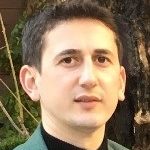 Sezgin Toska received his Ph.D. from the Atatürk University, Turkey. He was the Tübitak grantee for his postdoctoral research at the University of Idaho, USA, where he worked on a project on “Literary Ecocriminology.” He has published a monograph and several articles on ecocriticism and American culture and literature. With Sophia Emmanouilidou, he co-edited the book Transnational Interconnections of Nature Studies and the Environmental Humanities. His main research interests include ecocriticism, environmental humanities, and American literature and culture. He is currently Assistant Professor of English Language and Literature at the İzmir Kâtip Çelebi University.
Sezgin Toska received his Ph.D. from the Atatürk University, Turkey. He was the Tübitak grantee for his postdoctoral research at the University of Idaho, USA, where he worked on a project on “Literary Ecocriminology.” He has published a monograph and several articles on ecocriticism and American culture and literature. With Sophia Emmanouilidou, he co-edited the book Transnational Interconnections of Nature Studies and the Environmental Humanities. His main research interests include ecocriticism, environmental humanities, and American literature and culture. He is currently Assistant Professor of English Language and Literature at the İzmir Kâtip Çelebi University.Web page: click here
Ecocritics and others working in the environmental humanities have long been asking what good the humanities (and other disciplines) are in helping us to gain traction against the overwhelming humanitarian and ecological challenges we face in the early years of the twenty-first century. The emerging field of “empirical ecocriticism” adapts some of the investigative tools of the social sciences to the study of how various cultural texts affect the thoughts and actions of readers and viewers. In this talk, I will discuss some new projects that seek to apply empirical methods and theories of precarity as ways to explore how pandemic literature could play a role in stimulating a broader mindfulness that may be useful in confronting current and future crises. In particular, I will refer to such recent studies as Pramod K. Nayar’s Bhopal’s Ecological Gothic (2017) and Ecoprecarity (2019), and Sarah E. McFarland’s Ecocollapse Fiction and Cultures of Human Extinction (2021) as foundations for my discussion of Peter Heller’s pandemic novel The Dog Stars (2011).
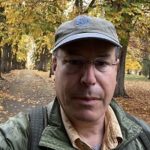 Scott Slovic is University Distinguished Professor of Environmental Humanities at the University of Idaho, USA. He served as founding president of the Association for the Study of Literature and Environment (ASLE) in the early 1990s, and from 1995 to 2020 was Editor-in-Chief of ISLE: Interdisciplinary Studies in Literature and Environment. The author and editor of numerous books, his forthcoming co-edited volumes include Nature and Literary Studies (Cambridge University Press, 2022) and The Bloomsbury Handbook to Medical-Environmental Humanities (Bloomsbury Academic, 2022).
Scott Slovic is University Distinguished Professor of Environmental Humanities at the University of Idaho, USA. He served as founding president of the Association for the Study of Literature and Environment (ASLE) in the early 1990s, and from 1995 to 2020 was Editor-in-Chief of ISLE: Interdisciplinary Studies in Literature and Environment. The author and editor of numerous books, his forthcoming co-edited volumes include Nature and Literary Studies (Cambridge University Press, 2022) and The Bloomsbury Handbook to Medical-Environmental Humanities (Bloomsbury Academic, 2022).Web page: click here
Symposium Conclusions, Closing Remarks (16:50-17:00)
Chair: Dr. Sophia Emmanouilidou
Technical details
- The Symposium will be based on the ZOOM platform.
- The videoconference link will be sent by email a few days before the conference.
- In order to have an easy and trouble-free participation please ensure that you have:
- a computer with a stable internet connection
- a headset (preferable) or speaker/microphone (integrated as in a laptop or external for desktop computers)
- a web camera (integrated or external)
- If you’ve never used Zoom before please click here, download and install Zoom Client for Meetings.
- You can test your internet connection, microphone, speakers and camera by joining a test meeting available here.
